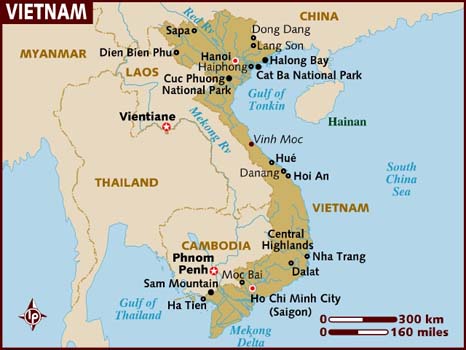
Forty years after it won the war, the Communist Party still rules Vietnam with an iron fist. But with crony capitalism, corruption and inequality now rife, many claim its victory was a hollow one.
From a shattered society plagued by poverty and food shortages, to a middle-income country and World Trade Organization member, Vietnam’s authoritarian socialist regime has overseen huge change since Saigon fell to communist troops four decades ago.
On Thursday, Communist Party rulers will gather for a military parade in Ho Chi Minh City — formerly Saigon — to commemorate the day their tanks rolled into city, prompting the surrender of the US-backed South and reunification of the country.
The war left millions of Vietnamese dead as well as 58,000 American servicemen sent to stanch the advance of the communists.
But critics say the victorious Communist Party is now ideologically bankrupt, with the state abandoning the social equality dreams of its founding president Ho Chi Minh and enforcing tight controls on an increasingly critical public.
“This is not a communist country,” says Le Cong Dinh, a lawyer and government critic, who remains under house arrest after a 2010 conviction on subversion charges.
“They came to power by adopting the socialism, communism of Marx and Lenin — that’s why they try to continue the ideology. But what we see on the streets of Vietnam is capitalism, not communism,” he told AFP in a rare interview at his closely monitored Ho Chi Minh City apartment.
Party sympathisers hail the rewards of the market reforms of the late 1980s — impressive growth rates, soaring foreign investment, and sharp reductions in poverty.
But as Huy Duc, a prominent author who wrote a book about post-war Vietnam, explained to AFP: “The winning side has been changing to become more like the losing side.”
Public anger with the one-party state simmers over a range of ills, including widening income disparity, land disputes and corruption scandals — often involving wealthy party cadres.
But the newfound prosperity of recent decades means the majority of the population seem content to accept the status quo for now, experts say.
And for many young job seekers the South has come to be seen as more socially liberal and free market-oriented than the conservative capital Hanoi.
– Ideological battle –
For some older Vietnamese who lived through the war, the ideological cleavage between the communist victors and the southern so-called “nguy” — puppets — has not been bridged.
“There was reunification in terms of political control, administration of the country, but there was no psychological integration,” Nguyen Ngoc Bich, a 70-year-old lawyer from South Vietnam who spent 12 years in a reeducation camp after the war, told AFP.
Soon after the South surrendered, hundreds of thousands fled in rickety boats — many drowning during their journeys — creating a 4.5 million-strong Vietnamese diaspora, often fiercely critical of Hanoi.
To this day, when any top party official visits the US, they are met with protesters flying the South Vietnam flag.
Historians say up to 200,000 of those from the South who stayed were sent to re-education camps from which the last prisoner emerged in 1992.
Due to tight control over the media and education system, experts say many people in Vietnam are not aware of the scale of the persecution in the post-war period.
The government denies running the camps and all allegations of persecution.
There was “no discriminative or inhumane activities against people of the old regime,” Vu Hong Nam, chairman of the Communist Party’s national committee on Vietnamese residing abroad, told AFP.
Only a small section of the overseas Vietnamese community oppose the government, he added.
“They left with prejudice and the prejudice remains the same as time goes by,” he said.
– ‘I have struggled alone’ –
Economically, South Vietnam’s fate after its surrender echoed what occurred in North Vietnam following the rise of the communists in 1954 — the state seized land, houses, factories, and shops.
The reforms of the late 1980s, sparked by a tanking economy, brought prosperity but the party’s networks have gorged on the newly created wealth, critics say.
“There was no moral foundation for development,” lawyer Bich said, arguing that state-owned enterprises are predominantly run by the well-connected rather than the competent.
The government says it is cracking down on graft, while keeping the economy on course for 6.2 percent growth in 2015 — its 24th straight year of expansion since economic reforms kicked in in 1991.
Yet for many of those who fought on the losing side, their struggles did not stop when the hostilities ceased.
Soldiers from the North who fought for the Communists receive pensions and healthcare support, while those from the South are not so fortunate.
“I’ve never received anything from the Vietnamese government, nothing,” said South Vietnam veteran, Nguyen Van Quang, 63, who lost both his legs above the knee in the war.
“I was a soldier, I fought for South Vietnam… but my life, compared to injured Communist soldiers, has been a struggle. And I have struggled alone.”



